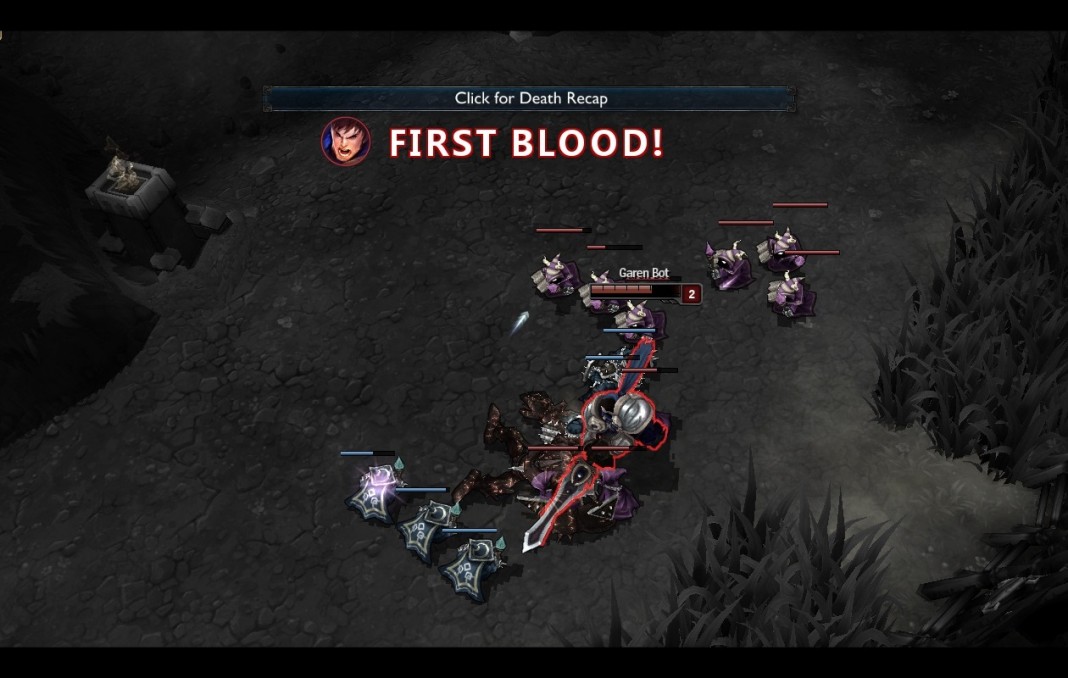“GG”. The game hasn’t even hit the 5 minute mark and your team’s morale is already in jeopardy. The game was declared over moments after you barely lost a close duel resulting in the enemy team earning the first blood gold. You know the game isn’t over. Even the player who muttered the “GG” knows the game isn’t over. Still, you are now at a disadvantage and will have to fight from behind in order to equalize the lane again.
Coming Back From a First Blood

400 gold is what separates you from your 1-0 lane opponent. That gold can translate to a long sword and a potion, boots and 2 potions, or many other small item component + potion combinations. There’s not a whole lot of combat stats that can be purchased for 400 gold. First blood grants your enemy an edge in lane from the gold, experience, and if you’re especially unlucky, a small CS lead, experience lead, and assist to the enemy jungler.
The game isn’t over if you give first blood because often times your lane isn’t even over. This becomes more true the lower you find yourself on the ELO scale. Challenger players have the skill and knowledge necessary to squeeze everything they can out of small leads. The further away from Challenger you are, the easier it is to make a come back. Lower level players are prone to making more mistakes. Often times the enemy will gift you comeback opportunities by making misplays. How many times have you allowed your opponent to equalize the lane after going too aggressive when fueled by that first blood confidence? I’ve done it at least twice this week alone.
Coming Back From a Larger Deficit

Things become trickier when you find yourself behind a couple of kills. At this point the opposing laner is likely ahead 700-800+ gold. They have a respectable item advantage that allows them to bully you in lane and compound their CS advantage. Finding an advantageous trading opportunity is rare, forcing you to pick up as much CS under turret as you can and wait for jungle pressure.
When behind 2-3 kills, you are in damage control. Unless your opponent makes a significant misplay, which is possible, you should keep scrapping to a minimum. Communication with your jungler is important at this stage. Your jungler has to worry about 3 lanes, plus keep track of the enemy jungler. They can’t read your mind. Let your jungler know (nicely) when you two are able to combine for a kill.
You May Like
When to Forfeit the Lane
https://www.youtube.com/watch?v=qGtggO2R5O8
Tower dives aren’t the easiest to pull off, as shown by this video, but if you’re far enough behind, they’re bound to happen.
If you find yourself in an especially unlucky situation in which your opposing laner is so far ahead that they are able to dive you at will, with or without the help of their (always) nearby jungler, it’s time to forfeit the lane. This is necessary when your 2v2 (you + your jungler) is weaker than the enemy 2v2. If your jungler is especially kind, they may be willing to apply some pressure to allow you to safely push out waves every now and then, but the lane is no longer safe for you to occupy alone.
Forfeiting your lane doesn’t mean that you sit at fountain typing in all chat until the wave pushes to your tier 2 tower. That is how you lose games. Forfeiting your lane the right way involves roaming around the map looking for opportunities to empower your teammates. This can mean attempting lane ganks, invading the enemy jungle with your jungler, or securing objectives while lane opponent pushes away in the empty lane. The right way to forfeit a lane is to be as active as possible around the map until you are able to farm safely in your lane again.
A Lost Lane Isn’t a Lost Game
You are giving up too early if you are mentally defeated after losing lane. Imagine how terrible sports games would be if a player stopped trying if a player on the opposing team playing the same role was out-scoring him. You don’t climb ELO by winning lane. Allowing yourself to get carried by your fellow teammates, while still remaining useful yourself, will win you more games.
















